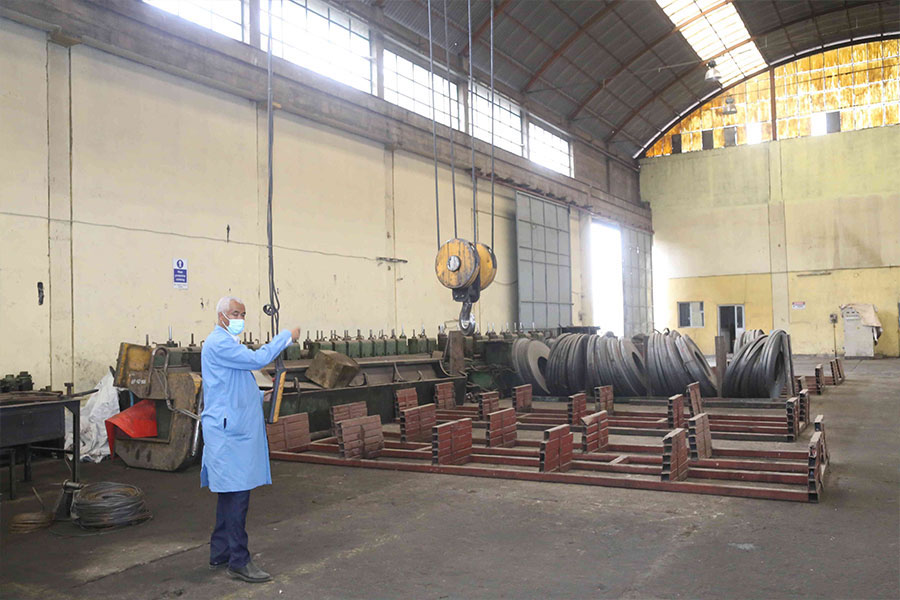
Covid-19 | May 02,2020
Illicit mining activities, particularly those conducted by unlicensed foreign operators, have severely impacted Ethiopia’s gold production, federal officials told members of Parliament (MPs). The report revealed the country’s gold production is a mere 35pc of the target, underlining the severity of the situation. The prevalence of “illicit actors” was blamed as one of the main impediments to lacklustre productivity.
Gold, comprising more than 80pc of the country’s mineral exports, brought in 150 million dollars over the third quarter of the current fiscal year. Ethiopia produced 2.68tns of gold, with a third of this output coming from artisanal miners. However, gold exports for last year amounted to more than 560 million dollars, indicating a significant shortfall in expected revenue 10 months into the current year.
A report from the Federal Police Commission revealed that 83 foreign nationals had been apprehended within six months for illegal mining activities in the Gambela and Benishangul regional states. The foreign actors were allegedly moving millions of dollars in illegal funds. Habtamu Tegene, minister of Mines, highlighted an overlap of licensing between federal and regional authorities, which he believes provides illegal miners a window to establish operations beyond the Ministry’s control.
The Minister’s report to Parliament underscored the gold mining sector awaiting the unfolding of a transformation with cautious optimism, recognizing the potential for a more robust and sustainable industry but also mindful of the challenges ahead. The industry serves as a reminder of resource management’s complexities and potential pitfalls, particularly in regions rich with natural resources but grappling with regulatory and oversight issues.
Industry operators applaud the Minister’s resolve to tackle the issues head-on and restore the gold mining sector to its full potential. With a comprehensive strategy to address illegal mining, unregulated trade, and the structural issues within the Ministry, he looked set to safeguard the country’s natural resources. However, the effectiveness of these reforms will largely depend on their implementation, the cooperation of regional and federal authorities, and the industry’s willingness to adhere to stricter regulations and international mining standards, cautioned Parliamentarians.
According to the Minister, the foreign miners exploit loopholes such as renting machinery equipment to access mineral-rich areas. The stark difference in dollar values between formal and parallel foreign exchange rates has reportedly encouraged local miners to opt for contraband alternatives.
The Minister attested before Parliament last week, stressing the need for an institutional overhaul within the Ministry and reform in the sector. He emphasized that a change in personnel is insufficient to transform the industry.

Habtamu was appointed to his current portfolio in November of last year, the fourth minister to hold such a position during Prime Minister Abiy Ahmed’s administration.
Industry operators laud the Minister’s determination to address the issues, demonstrated three months into his appointment.
Tesfaye Mehdane, the general manager of Akobo Minerals, a boutique mining company operating in the Segele Shama Gold District of Gambella Regional State, has witnessed many of these issues firsthand. His company has a concession to a flagship project in the area for a decade. He noted a tightening in the gold mining sector since the new Minister’s appointment, particularly after the Minister visited their project site.
“Illicit miners often misuse the label ‘artisanal mining’ to manipulate the licensing gap between regional and federal authorities,” Tesfaye told Fortune.
He blames these entities for sweeping into resource-rich areas near national borders, paying a premium for equipment rental and forcing licensed entities into competition for access. He emphasized that while artisanal mining is not inherently harmful, it does offer a legal loophole for unregulated gold miners. He asserted that illegal miners often use environmentally damaging methods, as they are not bound by international mining protocols.
Elias Kassahun, a mining expert and lecturer at the Addis Abeba Science & Technology Mining Department, noted that unregulated artisanal mining practices fuel smuggling.
“It could deter foreign investment in the sector,” he said.
According to Elias, harmful chemicals used by foreign illegal miners damage the environment and pose a long-term risk to the sector. After securing licenses from regional authorities to produce large quantities, these partnerships with the locals often submit a fraction of their production to the authorities.
Industry Insiders claim that the high parallel exchange rate for the Dollar, over 100 Br, incentivizes some miners to engage in contraband trade rather than submit their earnings to the central bank. The National Bank of Ethiopia (NBE) has recently increased royalty fees to a new high of 55pc for five kilograms of gold supplied by artisans.
Royalties fees have brought in 281.8 million Br in the last nine months. The Extractive Industries Transparency Initiative (EITI), a global standard for monitoring oil, gas, and mineral resources in over 57 countries, estimated Ethiopia’s gold reserves at 200tns.
The recent challenges facing Ethiopia’s gold mining sector have been met with a renewed determination from the Minister of Mines, a move welcomed by industry insiders. The Standing Committee on Industry & Minerals Affairs, chaired by Amarech Bakalo (PhD), acknowledged the Minister’s evident commitment to addressing the issues.
Amarech, however, sent a clear message to the Ministry’s officials, emphasizing that meticulous planning and adherence to those plans are what it would take to go forward.
PUBLISHED ON
May 13,2023 [ VOL
24 , NO
1202]

Covid-19 | May 02,2020

Viewpoints | Jun 05,2021

Fortune News | Oct 23,2021

Radar | Jun 17,2023

Editorial | Dec 30,2023

Radar | Nov 06,2021

My Opinion | Dec 16,2023

Fortune News | Aug 27,2022

Viewpoints | Jun 18,2022

Radar |

Dec 22 , 2024 . By TIZITA SHEWAFERAW
Charged with transforming colossal state-owned enterprises into modern and competitiv...

Aug 18 , 2024 . By AKSAH ITALO
Although predictable Yonas Zerihun's job in the ride-hailing service is not immune to...

Jul 28 , 2024 . By TIZITA SHEWAFERAW
Unhabitual, perhaps too many, Samuel Gebreyohannes, 38, used to occasionally enjoy a couple of beers at breakfast. However, he recently swit...

Jul 13 , 2024 . By AKSAH ITALO
Investors who rely on tractors, trucks, and field vehicles for commuting, transporting commodities, and f...

Apr 20 , 2025
Mufariat Kamil, the minister of Labour & Skills, recently told Parliament that he...

Apr 13 , 2025
The federal government will soon require one year of national service from university...

Apr 6 , 2025
Last week, the International Finance Corporation (IFC), part of the World Bank Group...

Mar 30 , 2025
When the private satellite channel, Ethiopian Broadcasting Service (EBS), aired an em...